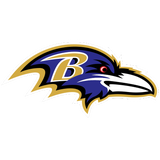
Broncos' quarterback situation inspires memories of 2001 Baltimore Ravens

With the news Wednesday that Denver Broncos quarterback Brock Osweiler has agreed to a deal with the Houston Texans, the recently crowned Super Bowl champions suddenly find themselves in something of a pickle.
On Monday, Peyton Manning made his retirement official after 18 seasons, and the hope, at least for some, was that the heir apparent Osweiler would re-up with the team and take the reins. But with Osweiler now the man in Houston, Denver is left without an incumbent starter or backup at QB and no one with so much as a single NFL pass attempt left to fill the vacancy under center.
There have been rumors in recent days about other quarterbacks the Broncos might target should Osweiler leave, but so far no one has signed on to battle former Northwestern quarterback Trevor Siemian, a 2015 seventh-round draft pick and the only QB left on the Broncos roster, for the job.
Thankfully for the Broncos, there's a blueprint in place for how to handle the loss of both a starting and backup quarterback as a defending Super Bowl champ, and in the case of the 2001 Baltimore Ravens, it led them all the way back to the playoffs.
When the 2000-01 season began, Tony Banks was the Ravens' lead signal caller, and through six games, Banks, whom the team acquired in a 1999 trade, had Baltimore at 5-1. Baltimore's record was not reflective of the way its offense was operating, however, and by the time back-to-back losses to the Washington Redskins and Tennessee Titans dropped the Ravens to 5-3, the team had gone four consecutive games without scoring a touchdown.

Trent Dilfer
It was at that point that Ravens coach Brian Billick made the decision to bench Banks in favor of Trent Dilfer, who'd signed a one-year deal with the team during the offseason after the Tampa Bay Bucs declined his option. Billick described the move as an effort to "change the impetus" for his team, but Dilfer, who threw a pick in the fourth quarter of the Tennessee game, was also unsuccessful in finding the end zone in his first start, a 9-6 loss to the Pittsburgh Steelers.
Fortunately, what the Ravens did have was a stalwart defense that held six of its first nine opponents to 10 points or fewer, including three shutouts. And from that point on, the Ray Lewis-led unit carried Baltimore to seven straight wins to close the regular season as Dilfer did his best to stay out of his own way, letting running backs Jamal Lewis and Priest Holmes do most of the heavy lifting.
Thanks to that incredible defensive unit, which set NFL records with 165 points allowed and 970 rushing yards allowed during the regular season, Baltimore made the playoffs at 12-4, then rode that momentum to a Super Bowl XXXV championship.
All things considered, the Ravens' run that season was not unlike the Broncos' in 2015 -- a historic defensive effort saving a below-average offensive team from itself -- and like Denver now, Baltimore found itself without a quarterback soon after raising the Lombardi Trophy.
Shortly after winning the Super Bowl, Dilfer left for Seattle and Banks signed with Dallas and eventually latched on with Washington after being cut by the Cowboys during camp.The departures left Chris Redman as the only quarterback holdover on the Baltimore roster, but Redman, a 2000 third-rounder, was not given the keys to the title defense -- much as Denver's 2016 effort likely won't rest on the efforts of Siemian.
Instead, Baltimore signed a pair of veterans in 38-year-old Randall Cunningham and 31-year-old Elvis Grbac, each of whom went on to play his last NFL snap in a Ravens jersey during the 2001 season.
With Grbac the starter and Cunningham backing him up, Baltimore went 10-6 in 2001 and made the playoffs after finishing second to Pittsburgh in the AFC Central. In the Wild-Card round, Baltimore's defense limited the Miami Dolphins to 151 total yards -- one of seven opponents held under 225 yards that season -- before eventually falling to the Steelers in the Divisional Round.
Now the question is whether the Broncos can follow the 2001 Ravens' lead as they rebound from the loss of an all-time great and a capable fill-in at quarterback.

The franchise encountered a similar situation following the retirement of current general manager John Elway in 1999. Coming off back-to-back Super Bowls, the Broncos gave the starting job to Brian Griese, the team's third-string quarterback during its Super Bowl XXXIII run, and dropped Bubby Brister, Elway's backup in '98, to third string. Denver then brought Chris Miller out of a three-year retirement to handle backup duties, but the results were not ideal.
The trio of quarterbacks combined to go 6-10 on the year, the start of a 12-season stretch that included just one division title and one playoff win.
The Broncos' offensive coordinator at the time of Elway's retirement was Gary Kubiak, who is now entering his second year as the team's head coach. He no doubt recalls the franchise's struggles as it moved on from Elway, but with a returning defense more reminiscent of the 2001 Ravens than the 1999 Broncos, the hope for Kubiak is that he won't have to relive it, regardless of who's under center when the 2016 season starts.
You can follow Sam Gardner on Twitter or email him at samgardnerfox@gmail.com.










